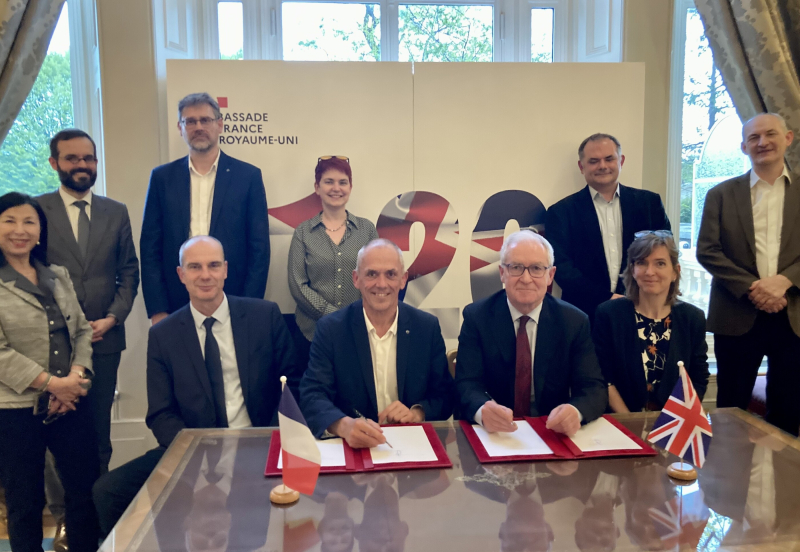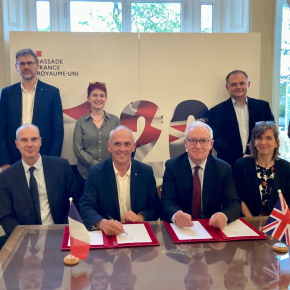The Abraham de Moivre International Laboratory, backbone of the scientific and mathematical relations between the United Kingdom and France
Created in 2018, the Abraham de Moivre International Research Laboratory (IRL) is a joint laboratory between CNRS and Imperial College London whose aim is to establish a long-term partnership between the French and British mathematical communities. In April 2024, the laboratory has been renewed for a further 5 years, enabling it to further develop scientific collaborations between the two countries.

The origins of a fruitful collaboration
Located within the Department of Mathematics at Imperial College London, the Abraham de Moivre IRL covers all areas of mathematics and its interactions with other disciplines such as physics, computer science, biology, economics and social sciences. More specifically, the themes highlighted for the period 2023-2027 are artificial intelligence in science, mathematics of planet Earth, number theory, analysis, partial differential equations, financial mathematics, stochastic analysis, statistical mechanics and mathematical physics, applied mathematics and biomathematics.
The laboratory was named in honor of the 17th and 18th century French mathematician Abraham de Moivre. He settled in London after the revocation of the Edict of Nantes by Louis XIV in 1685, becoming a member of the Royal Society and establishing himself as a pillar of the English scientific community alongside, among others, Isaac Newton and Edmond Halley. Abraham de Moivre played a leading role in the development of geometry and probability theory.
The creation of the Abraham de Moivre joint laboratory was intended to consolidate existing relations between the English and French mathematical communities. Collaboration between CNRS and Imperial College London began with the creation of the ICL-CNRS Fellowships, jointly funded by Imperial College's Department of Mathematics and the National Institute for Mathematical Sciences and their Interactions (Insmi), which enabled French researchers to spend long-term periods at Imperial College. The new laboratory has enabled this program to be strengthened and extended by offering British researchers the opportunity of long-term stays in the various French mathematical research units attached to Insmi. Beyond this program, the existence of a joint laboratory has boosted exchanges and facilitated the organization of research networks, workshops and conferences between the two communities.
Since then, the connections between CNRS and Imperial College have gone from strength to strength. After the creation of the Abraham de Moivre IRL in 2018, this collaboration will reach a new stage in 2022 with the creation of an International Research Center (IRC). A major milestone in the cooperation between the two institutions, this new facility will build on a rich foundation of existing collaborations, particularly in the mathematical sciences. This IRC, like the Abraham de Moivre IRL, contributes to the development of Franco-British collaboration in mathematics, and constitutes a strong scientific anchor between the two countries.
Dynamic Franco-British collaboration in mathematics
Numerous programs exist to encourage mobility and exchanges between the two institutions. The IRL Abraham de Moivre offers a wide range of opportunities for researchers to develop their research projects through collaboration. Firstly, ICL-CNRS Fellowships offer extended visits to members of Insmi's UMRs in the Mathematics Department. Short-Term Exchange Grants enable Imperial College researchers to stay in French laboratories, or to host their French counterparts in London for a short period. There are also three-month inward placements at Insmi and an Imperial-CNRS Collaboration Fund. The IRL is also very popular with scientists from other CNRS institutes, who find it an interesting way of interacting with their research. At present, the Abraham de Moivre laboratory is hosting Marie Touboul, a CNRS Engineering researcher working on metamaterials.
Looking for mobility?
Insmi strongly encourages researchers interested in mobility at the IRL Abraham de Moivre to apply to the 2025-2026 mobibility campaign, currently open.
Finally, the Imperial-CNRS PhD Joint Programme has launched its 5th call, which is open to all disciplines and supports an average of 4 to 6 projects per call. Each of these projects includes one PhD student from each institution, each of whom is expected to spend time at Imperial College as well as at the partner CNRS laboratory during their PhD. Two mathematics projects are currently hosted by the Abraham de Moivre laboratory.
Focus on one of these projects
Gabriel Stoltz, CERMICS researcher and member of the Bezout Research Federation1 , and Grigorios Pavliotis, researcher at the Department of Mathematics at Imperial College, where awarded a funding for their project "Nonequilibrium statistical physics -- mathematical analysis and algorithms". This project lies at the interface of various fields of mathematics, ranging from functional analysis and the theory of partial differential equations, to probability theory and the study of stochastic processes, with some emphasis on the associated numerical analysis. The aim is to construct and mathematically analyze variance reduction methods to efficiently compute stationary properties of nonequilibrium stochastic dynamics (in particular in the linear response regime), as opposed to standard brute force numerical methods based on plain time averages which suffer from intrinsic limitations.
The research team gathers in addition of the two PIs Andrew Duncan at Imperial College, as well as Tony Lelièvre and Urbain Vaes at Federation Bezout. The funding allowed to recruit Raphael Gastaldello in December 2023 as a PhD student at Federation Bezout, and a PhD student is in the process of being recruited at Imperial College. Raphael Gastaldello already visited Grigorios Pavliotis once in London, and is planning extended stays in London in the coming year in order to kick start some joint project with Greg Pavliotis. The mobility funding (5000 euros/year on the French side) makes it very easy for the PhD student involved in the project to spend a significant amount of time in London, and facilitates the simultaneous visits of more senior researchers.
- 1CNRS/École des Ponts Paristech/Université Gustave Eiffel/Université Paris-Est Créteil Val-de-Marne
The second project is led by Judith Rousseau, researcher at CEREMADE2 , and Kolyan Ray, researcher at Imperial College. Funded via the PhD Joint Programme 2023 campaign, it will start at the beginning of the 2024 academic year.
Research rooted in current societal challenges
Building on its success and dynamism, the Abraham de Moivre laboratory intends to push its development even further over the next 5 years, by encouraging its mathematicians to work on the major challenges facing our society such as climate, health and sustainable development. Similarly, many emerging technologies destined to become part of society are based on mathematics and need to be further developed through research. Artificial intelligence and machine learning, for example, are generally based on complex algorithms, which IRL scientists aim to improve in a number of areas.
The laboratory is also keen to increase the number of European-funded projects and improve mobility between France and the UK. With this in mind, the European Research Council recently awarded a grant of almost 10 million euros to encourage applications and projects under Horizon Europe. France and the UK are thus planning to strengthen their cooperation in research and innovation, which could have repercussions at laboratory level, as in the case of the ERC Synergy STUOD (Stochastic Transport in Upper Ocean Dynamics) project, for which funding of 10 million euros has enabled the creation of a team of some 30 scientists divided between London, Rennes and Brest, to study how the oceans react to climate change.
- 2CNRS/Université Paris Dauphine - PSL
